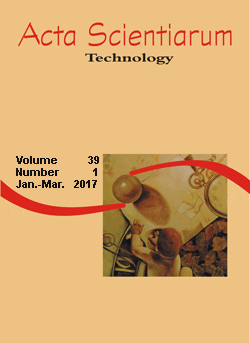<b>Flexural properties of four fast-growing eucalypts woods deteriorated by three different field tests
DOI:
https://doi.org/10.4025/actascitechnol.v39i1.27067Keywords:
Biodegradation, biodeterioration, soil contact, outdoor exposition, brittleness.Abstract
Durability is a wood characteristic determined by several factors, making it difficult to investigate the service life of pieces designated for outdoor use. In this study, the decaying of juvenile and adult woods of four fast-growing eucalypts from southern Brazil subjected to three different exposure environments was monitored through mechanical properties (flexural test). The study material was obtained from adult trees of Eucalyptus botryoides, Corymbia citriodora, Eucalyptus paniculata and Eucalyptus tereticornis. Field tests were conducted in the city of Piratini, southern Brazil, and samplings were carried out during 540 days of experiment. Comparing the four eucalypts, the decreasing order of biological resistance was: Eucalyptus tereticornis, Corymbia citriodora, Eucalyptus paniculata and Eucalyptus botryoides. The mature wood showed greater and more stable physical-mechanical properties than juvenile wood.
Â
Downloads
Downloads
Published
How to Cite
Issue
Section
License
DECLARATION OF ORIGINALITY AND COPYRIGHTS
I Declare that current article is original and has not been submitted for publication, in part or in whole, to any other national or international journal.
The copyrights belong exclusively to the authors. Published content is licensed under Creative Commons Attribution 4.0 (CC BY 4.0) guidelines, which allows sharing (copy and distribution of the material in any medium or format) and adaptation (remix, transform, and build upon the material) for any purpose, even commercially, under the terms of attribution.
Read this link for further information on how to use CC BY 4.0 properly.



















8.png)




